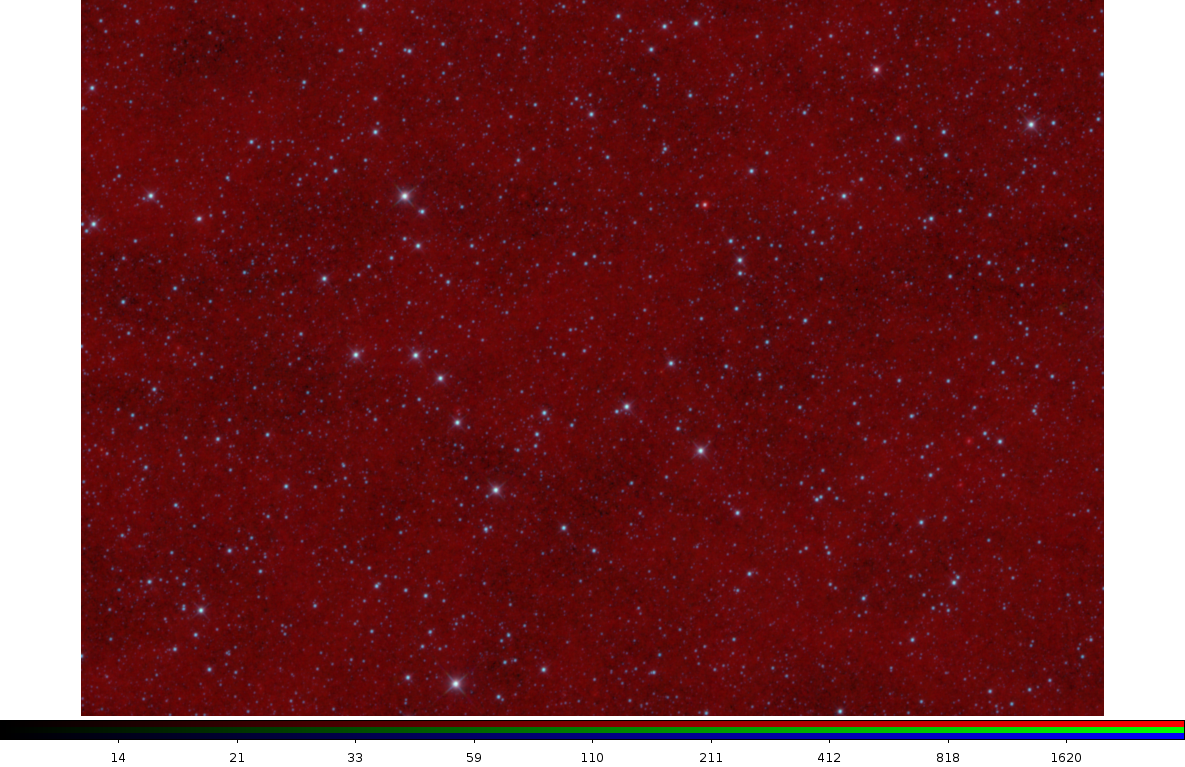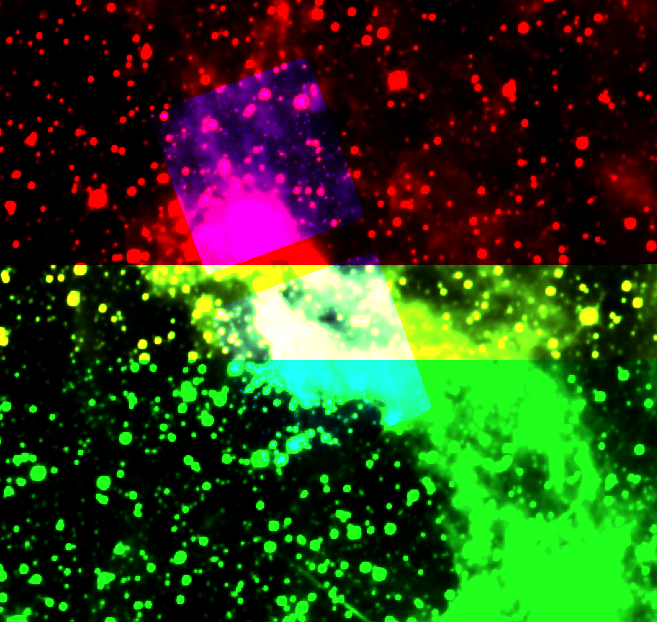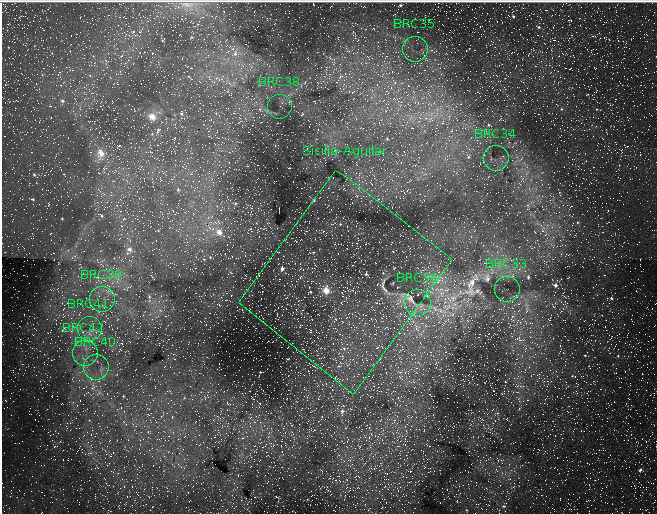C-WAYS: follow the bouncing target selection
OK, so at the AAS we talked about LDN 1548 as a viable option. It had, we thought, good potential for yielding new young stars, it was (in projected distance) near Taurus, it has the potential for being actually related to the Taurus Molecular Cloud (and thus of scientific interest). It also has SDSS data in the archive, so that's a strong plus -- more data will help us weed out the contaminants.
BUT.
I just went and got the whole WISE tile. It's REALLY diffuse star formation, MUCH worse than I remembered. I mean, bad enough that I went and checked the coordinates. More than once. This is what I see. There is not a lot here, and there is going to be a TON of contamination: 
I've gone back to my Taurus collaborators to figure out why we thought there was something interesting there.
But that probably drops us back at the beginning in terms of target selection, sigh. Sorry. But, this is real science, and I (honest-to-God) do NOT know the answer before we get into this. This is the real thing, folks.
The approach we talked about will be the same; we just need to find a better target.
So.
I decided to go resurrect some of the other regions that were under consideration. They were:
- LDN 1548- really diffuse and un-dramatic in WISE. sigh.
- "north of LDN 1509" -- Wilson had that in his poster, and that too is really diffuse star formation, so contamination is going to be high. But at least likely to yield more YSO candidates than LDN 1548 as far as I can tell. ON the other hand, Wilson wants to do that region! :)
- NGC 1579 -- still near (in projected distance) to Taurus - see fig 2 in the Taurus paper. It has high nebulosity in parts. There are famous objects here. Spitzer data too. A friend has an AAS abstract from 2007 claiming results with Spitzer, but there is no paper from it. I don't want to scoop him. Also potentially complicated data reduction. Probably not a good target.
- Continuing the BRC27/34 work begun by the 2011 team. BRC 34 is not in the data that are public right now, but BRC 27 is, and it is also part of a region of star formation in CMa that another friend was thinking about working on, but was willing to let it go. I don't think that you guys could handle the huge multi-degree span (read: millions of sources) that this thing really covers, but maybe working just around BRC 27, and BRC 34 since it will be available in March, is tractable? It is nice to have Spitzer for comparison (for a lesson in spatial resolution). BRC 27 is right on the border between two WISE tiles, so I can't make a pretty 3-color image for you. You kind of have to trust me ('cause you know, I've been so good at that so far) that this is an interesting region. In this eyeball-wrenching image, I did red as one WISE tile, green as the other WISE tile, and blue as the Spitzer data. You can see that the cloud clearly extends beyond the Spitzer boundaries. We'd have to decide how far out to search.
- Other BRC options - we had considered BRC 31, 36, 38. BRC 31 is already thoroughly done (Rebull et al. 2010). BRC 34, BRC 36 and BRC 38 are all close to IC1396, another region I'm studying with another project. BRC 36 is in the region likely to be done to death. Our notes from a year ago say that the Spitzer data for BRC 38 are done, but I can't find the paper. We could start again from the entire BRC list and sort again? See figure below for context. The big square is someone else's (published) thesis data. The big blobby thing next to BRC 36 is this, also done to death. We are also monitoring this region for changes in the stars. But BRC 38 may be a good one, or the larger context around BRC 34 or 38 (with WISE) would also work.
- Other LDN options:
- Babar, who you have not yet met, has also suggested the following. He has Spitzer data on a few Lynds dark clouds. LDN 65 is in the WISE public release but is likely a sterile (no YSOs) cloud. The other two LDN 877 and LDN 885 do not have WISE data released yet but they are likely more promising. I've seen some of his Spitzer data, and they do look promising.
- I had a NITARP team a previous year that had to find a Lynds cloud that was likely to harbor YSOs, not well-studied, and not yet observed with Spitzer. Not an easy proposition. Lynds Target Selection is from early that year when we were trying to settle on a target. That year, in the end, we picked LDN 425 and 981. I don't think we found any reasonable YSOs -- just AGN. The targets we rejected that year were LDN 951, LDN 1143, LDN 1598, and LDN 1685. See the Lynds Target Selection page, near the bottom, for summary and images.
- Summary of several LDN choices, then:
- LDN 65 - Babar has Spitzer data, now available in WISE, unlikely to harbor YSOs.
- LDN 425 - 1 IRAS source, 1 known YSO here, picked for NITARP team before, spitzer data exist, now available in WISE, most likely no YSOs.
- LDN 877 - Babar has Spitzer data, not yet available in WISE, possible YSOs.
- LDN 885 - Babar has Spitzer data, not yet available in WISE, possible YSOs.
- LDN 951 - two submm starless cores here (rejected as prior target), no Spitzer data, not yet available in WISE, linear intriguing shape in POSS.
- LDN 981 - V1331 Cyg (famous object) at end of one of filaments; picked for NITARP team before, spitzer data exist, not yet available in WISE, probably no YSOs. But with WISE, can cover larger region than we did before, FWIW.
- LDN 1143 - 1 IRAS source, 1 known YSO here, 1 "very red object" (YSO?), sort of a checkmark shape in POSS (rejected as prior target), no Spitzer data, not yet available in WISE.
- LDN 1340 - considered as target before, dropped so as not to scoop someone who has since retired from astronomy without completing this project. Spitzer data here, WISE data available now and they look interesting, we could do both Spitzer+WISE data here. Would have to scrape literature to be sure we understand what has been done before -- simbad has 17 refs, so not ridiculous. image(s) on Lynds target selection page from that year, midway through the page.
- LDN 1598 - 19 refs in SIMBAD, part of Lambda Ori complex; also IRAS 05496+0812, also WB89 718, also HH 117 VLA 1 (so clearly several people have looked here before). no Spitzer data here (I don't think), WISE data available but tile clobbered by insanely bright star nearby. Nebulous. Unclear from image if this is a good plan or not.
- LDN 1685 - 10 references in SIMBAD, IRAS source, diaphanous in POSS, now available in WISE - fuzzy with some bright sources. Hm. possibly interesting, but also dispersed SF here.
- OR... start with the whole LDN list and sort again ....?
So, from where I sit, at the moment anyway, I think maybe following up the BRCs (WISE mostly, leveraging off Spitzer from last year's team), or LDN 1340 (we'd do Spitzer+WISE).

